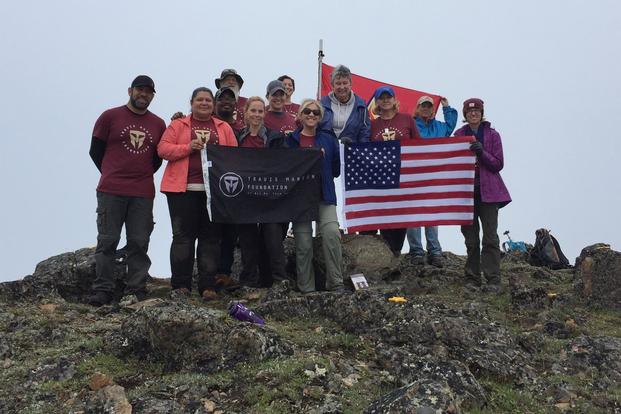EAGLE RIVER, ALASKA -- When families of the fallen climb 4,148 feet to the top of a mountain near this Anchorage suburb, they aren't looking to just bag another peak or get a good view of Alaska's Matanuska-Susitna Valley. They are looking for healing.
Officially named early this year, Gold Star Peak has quickly gained traction among surviving families and organizations that support them as more than just a challenging hike in Alaska. It's not just any mountain, people who have led groups to the top say, it's their mountain. And climbing it brings more than just good exercise, they say -- it brings healing.
"It definitely has something powerful about it," said Kirk Alkire, an Army veteran who spearheaded the effort to name the peak. "It just keeps going."
Alkire has long made it his responsibility to ascend the mountain multiple times per year to care for the POW/MIA and U.S. flags that stand at the mountain's gusty summit. But last year while passing by what had been an unnamed peak on the hike to POW/MIA, Alkire was struck by the idea of naming a peak in honor of families of the fallen next to the one honoring the missing.
So he set off on a personal mission to designate the peak. He gathered signatures, got community buy-in from local native Alaska tribes, cities and the military survivor community and presented his proposal to the U.S. Geological Survey, which oversees mountain designation. Officials there gave the OK in February.
Since then, Alkire has guided over 125 people on over 25 climbs up the challenging trail, with most of those hikes occurring over Alaska's summer months, after the trail has cleared of snow. Military survivor organizations, such as the Travis Manion Foundation, have sent groups to do the climb. And Alkire is working with a newly formed nonprofit, Gold Star Peak, Inc. and a team of volunteers to design memorial plaques for the top of the mountain and a nearby park where those who cannot climb can easily view the summit from the ground.
Although the term "Gold Star" typically refers to families of troops who have been killed during overseas conflicts, families of the fallen of all backgrounds have taken ownership of the peak and see it as their own mountain, set aside in honor of their experience, Alkire said.
The steep climb of several miles is a challenge even to fit hikers, but because of that, it offers a time of reflection and healing on the way to the top. Alkire said his team of about a dozen guides, many of them veterans, is committed to making each trip a success.
"That gain in elevation from the very first step is taxing on the lungs, on the heart, everything is pumping," he said. "And we could honestly say the Gold Stars we've taken up, every one of them has made it. We have done it in five hours round trip with a Gold Star, and we've done it in close to 12 hours. My team and I are committed to getting every single one of them who wants to do it to the top."
Alkire believes physical challenges, like hiking, can help people work through emotional challenges. It's a therapy that has fueled his own climbs up POW/MIA, which he makes in honor of his former Army unit, 2nd Battalion, 377th Parachute Field Artillery Regiment, 4th Brigade Combat Team (Airborne), 25th Infantry Division, and the 53 soldiers who were killed during in Iraq over their 2007 to 2008 deployment, including four who had been captured by Iraqi insurgents.
And it’s not just Alkire who believes that. Tina Tranauskas, who manages service projects for the Travis Manion Foundation like the trip that brought them to Alaska this summer, hiked the peak with a group of families of the fallen during their recent trip.
“What we do at Travis Manion is give ... the opportunity for families to come together and serve in honor of their loved one. Then to top the week off like that with something so physically challenging … you couldn’t have prescribed a better ending to our week,” she said. “I think they feel ownership, that this is their mountain. I think they’re grateful for that place to go.”
The burden of military loss is like a rucksack, Alkire said. As he guides families of the fallen up the mountain, he can see them carrying that proverbial ruck and emptying it along the way.
"Gold Stars have such an enormous amount of weight that they are carrying on their back. They have a rucksack full of so many different things associated with their lives, and that is what has motivated and pushed so many to the summit," he said. "For a lack of better words, it's addictive, but the reason why is that it's helping ... it's absolutely digging up stuff that's been packed away for a long time."
Better yet, he said, pairing veterans to lead families of the fallen on the hike helps both groups deal with their emotional burdens.
"Taking them on these hikes and summits, and sharing that moment with a Gold Star, it's absolutely unpacking and unloading that rucksack," he said. "We've definitely started to see where it's emotional for everyone, but it's OK for us veterans. We're in an absolutely safe place -- no one is shooting at us. But we're talking about bad times."
Alkire said he has no plans to stop guiding groups up the mountain, and is willing to help any family of the fallen who wants to make the trip. Still, he hopes that the challenge of making it to the top keeps the peak a sacred, little visited place set aside for those looking to heal.
“I hope that’s what helps keep the place free from too much traffic … people don’t want to mess with it, with the exception of Gold Stars,” he said.
-- Amy Bushatz can be reached at amy.bushatz@military.com.











